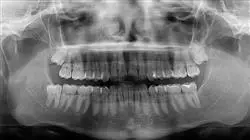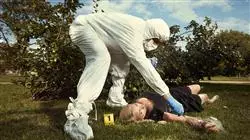University certificate
The world's largest faculty of nursing”
Why study at TECH?
Improve your knowledge in Forensic Thanatology for Nursing through this program, where you will find the best didactic material with real clinical cases. Learn here about the latest advances in the specialty to be able to provide quality medical care"”

This Postgraduate diploma allows to unite the scientific application with the practical part already practiced, adding at the same time an adaptation to the new technologies with the implementation of the online specialization.
It allows the student to learn the basic principles necessary for the study of forensic thanatology, forensic pathology, forensic sexology, forensic toxicology, forensic psychiatry, damage assessment, anthropology, and criminalistics.
The Postgraduate diploma covers the needs of professionals who demand adequate knowledge that allows them to perform forensic assessments, expert reports, as well as the ability and fluency to ratify the opinion and understand the phases of the judicial procedure when necessary.
At the same time, it offers the possibility for all students to learn how to assess not only bodily injury, but also to quantify negligence, assess disability, and determine disabilities.
Currently, law firms and private clients require a forensic expert examination for most of their procedures. It is for this reason, in addition to the lack of existing professionals, that TECH considers it appropriate to implement a correct, up-to-date, and especially useful syllabus for daily practice in this professional area.
The Postgraduate diploma is divided into specific blocks that also coincide with the syllabus given for access to forensic doctor positions offered by the Ministry of Justice, which highlights the quality of the content and its breadth.
Improve your knowledge through the Postgraduate diploma in Forensic Thanatology and Criminology for Nursing, in a practical way and adapted to your needs"
This Postgraduate diploma in Forensic Thanatology and Criminology for Nursing contains the most complete and up-to-date scientific program on the market. The most important features include:
- Development of more than 75 clinical cases presented by experts in Forensic Thanatology and Criminology for Nursing.
- Its graphic, schematic and practical contents provide scientific and assistance information on those disciplines essential for the professional practice.
- Diagnostic-therapeutic novelties on evaluation, diagnosis and intervention in Forensic Thanatology and Criminology for Nurses.
- It contains practical exercises where the self-assessment process can be carried out to improve learning
- An algorithm-based interactive learning system for decision-making in the clinical situations presented throughout the course.
- With special emphasis on evidence-based medicine and research methodologies in Forensic Thanatology and Criminology for Nursing.
- All of this will be complemented by theoretical lessons, questions to the expert, debate forums on controversial topics, and individual reflection assignments.
- Content that is accessible from any fixed or portable device with an Internet connection
This program is the best investment you can make in the selection of a professional program for two reasons: in addition to upgrading your knowledge in Postgraduate diploma, you will obtain a diploma from TECH Global University"
It includes in its teaching staff professionals belonging to the field of Forensic Thanatology and Criminology for Nursing, who pour into this program the experience of their work, in addition to recognized specialists belonging to scientific societies of reference.
The multimedia content, developed with the latest educational technology, will provide the professional with situated and contextual learning, i.e., a simulated environment that will provide an immersive educational program designed to prepare in real situations.
This program is designed around Problem-Based Learning, whereby the medical must try to solve the different professional practice situations that arise throughout the course of the program. For this, the physician will be assisted by an innovative interactive video system developed by recognized experts in the field of Forensic Thanatology and Criminology for Nurses and with extensive teaching experience.
Increase your decision-making confidence by updating your knowledge with this University Expert course"

Don't miss the opportunity to improve your knowledge in Forensic Thanatology and Criminology for Nursing to improve patient care"
Syllabus
The structure of the contents has been designed by a team of professionals from the best hospitals and universities in the country, aware of the relevance of current skills to intervene in the diagnosis, treatment and monitoring of Forensic Thanatology and Criminology for Nursing, and committed to quality teaching through new educational technologies.

This Postgraduate diploma in Forensic Thanatology and Criminology for Nursing contains the most complete and up-to-date scientific program on the market"
Module 1. Introduction to Forensic Nursing
1.1. Identifying Injuries
1.1.1. Concept of the Problem
1.1.2. Methodology
1.1.3. Legal Applications of Expert Evidence
1.2. The Role Played by Forensic Nurses
1.2.1. Simulation
1.2.1.1. Detection
1.2.1.2. Simulation vs. Factitious Disorder
1.2.2. Dissimulation
1.2.2.1. Detection
1.2.3. Syndromes
1.2.3.1. Münchhausen Syndrome
1.2.3.2. Münchhausen Syndrome by Proxy
1.2.3.3. Medea Syndrome
1.3. Phytotoxicology
1.3.1. Introduction
1.3.2. Drug Intoxications
1.3.3. General Phytotoxicology
1.4. Forensic Evidence Collection in Nursing
1.4.1. Evidence Collection
1.4.1.1. Blood
1.4.1.2. Semen
1.4.1.3. Hair
1.4.1.4. Pollen
1.4.1.5. Exudates (Other Samples)
1.4.2. Storage and Transport of Samples
1.4.2.1. Chain of Custody Concept
1.4.2.2. Documentation
1.4.2.2.1. Assessment Sheet
1.4.2.2.2. Functional Patterns
1.4.2.2.3. Requirements
1.4.2.2.4. Nurses Report
Module 2. Forensic Thanatology
2.1. Forensic Thanatology
2.1.1. Concept and Content
2.1.2. Concepts of Death
2.1.3. Degrees of Death
2.2. Different Ways of Dying
2.3. Course and Speed of Death
2.3.1. Agony Indicators
2.3.2. Precedence in Multiple Deaths
2.4. Diagnosis of Death
2.4.1. Concept and Methodology
2.5. Death Demonstrated
2.5.1. Encephalic Death
2.5.2. Death in Cardiac Arrest
2.6. Cadaveric Phenomena
2.6.1. Concept
2.6.2. Classification
2.7. Cooling
2.7.1. The way they are formed
2.8. Dehydration, Lividity, and Hypostasis
2.8.1. The way they are formed
2.9. Stiffness and Spasm
2.9.1. The way they are formed
2.10. Autolysis and Putrefaction
2.10.1. Chronology of Putrefaction
2.11. Preservative and Transformative Phenomena of the Cadaver. Saponification
2.11.1. Concept and Classification
2.12. Preservative and Transformative Phenomena of the Cadaver. Mummification
2.12.1. Concept
2.12.2. Phases of the Process
2.13. Preservative and Transformative Phenomena of the Cadaver. Corification
2.13.1. Concept
2.13.2. Phases of the Process
2.14. Other Cadaveric Phenomena
2.14.1. Concept
2.14.2. Phases
2.15. Duration of Death
2.15.1. Concept and Importance
2.15.2. Routines and Means of Dating Death
2.16. Criminal Judicial Autopsy and Civil Judicial Autopsy
2.16.1. Definition and Methodology
2.16.2. Forms of Action
2.17. Autopsy Times
2.17.1. External Cadaveric Examination
2.17.2. Internal Cadaveric Examination
2.18. Auxiliary Techniques for Forensic Medical Necrodiagnosis
2.18.1. Classification and Concept
2.19. Vital, Perimortal, and Postvital injuries
2.19.1. Origin
2.19.2. Routines
2.19.3. Diagnostic Methods
2.20. Discovery of the Corpse
2.20.1. Removal of the Corpse
2.20.2. Site Inspection
Module 3. Criminology
3.1. Identification in Forensic Science
3.1.1. Identification of People
3.1.2. Identification of Recent and Old Corpses and Remains
3.1.3. Identification from Clues
3.2. The Study of Prints
3.2.1. Zuckerman
3.2.2. Eysenck
3.2.3. Cloninger
3.3. Bloodstain Investigation
3.3.1. Social Personality
3.3.2. Deviant Personality
3.3.3. Antisocial Personality
3.4. Other Biological Stains
3.4.1. Egocentrism
3.4.2. Aggressiveness
3.4.3. Lability
3.4.4. Emotional Indifference
3.5. Forensic Genetics
3.5.1. Origin of Criminology
3.5.1.1. Definitions of Interest
3.5.2. Personality Criminology
3.5.2.1. Concept
3.5.3. Clinical Criminology
3.5.3.1. Concept
3.5.4. Developmental Criminology
3.5.4.1. Concept
3.5.5. Interpretation Levels
3.5.5.1. Behavioral Level
3.5.5.2. Individual Level
3.5.5.3. General Level
3.6. Forensic Ballistics
3.7. Copy Documents and Forensic Handwriting

A unique, key and decisive training to give a boost to your professional development”
Postgraduate Diploma in Forensic Thanatology and Criminology for Nursing
Are you looking to orient your professional career towards Forensic Nursing? TECH has the answer for you! The Postgraduate Certificate in Forensic Thanatology and Criminology for Nursing is a program designed from a solid training in the different areas of forensic pathology, thanatology and forensic toxicology, damage assessment, anthropology, among others. With a 100% online methodology, you will be able to adapt your study to your needs and schedules, which will allow you to make your training compatible with your work activity.
Broaden your career field with this 100% online program
The application of forensic nursing is an increasingly important field in criminal investigation and justice. By taking this Postgraduate Diploma in Forensic Thanatology and Criminology for Nursing you will be qualified to perform forensic assessments, expert reports, as well as to ratify the opinion and understand the phases of the judicial procedure when necessary. In this way, you will have acquired specific competencies in the evaluation of bodily injury, the quantification of negligence, the assessment of incapacity and the determination of disabilities.







